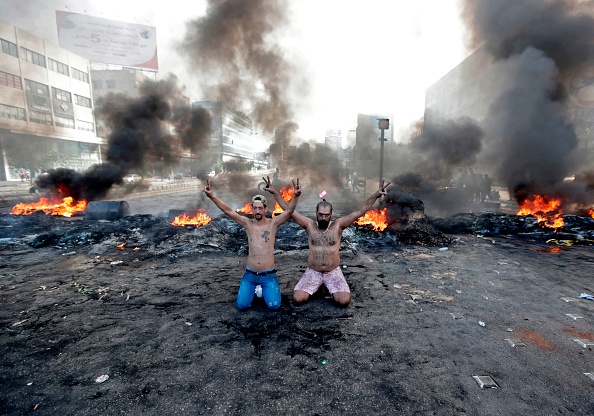WHY ARE THEY PROTESTING?
Going on since October 17, the protests were sparked by the government’s announcement of a fresh round of taxes, including on WhatsApp, to address the country’s public debt - the world’s third-highest debt to GDP, currently standing at about $86 billion, or 150 percent of its gross domestic product - exploding popular discontent unprecedented in its nature and scale. Many Lebanese use the internet communication service in place of the nation’s dysfunctional telecommunications sector.
Economic problems have long plagued the diverse Middle Eastern country, home to 6 million people and 18 different religious communities. For years, anger has been brewing over the country’s economic stagnation, corruption, the looming currency crisis and a deterioration of basic public services, which have roots in decisions made after the end of the Lebanese civil war in 1990. Lebanon’s current account deficit stands at an eye-popping 25 percent, meaning it imports far more than it exports, spends more than it saves, and relies heavily on foreign remittances to stay afloat. As economists have noted, the top 1 per cent now controls a quarter of all national income while the poorest half of the country owns just a tenth. As one Carnegie Endowment scholar puts it, about 3,000 people in Lebanon make as much as more than 2 million. One in four Lebanese people are unemployed, including one in three young people who find themselves economically excluded and politically disenfranchised.
In recent weeks, anger rose over the sudden shortage of dollars – raising fears over the supplies of medicine, wheat and fuel, and in September, the country’s government declared an economic state of emergency. The Lebanese pound has been pegged at 1,500 to the dollar since 1997, but a shortage of dollars at local banks has led to the black market exchange rate rising to about 1,650. Last year, international donors pledged $11bn of aid and loans to boost Lebanon's economy. In return, the government committed to implement reforms that would help reduce its debt. Hariri blames parties in his coalition for obstructing reforms required the aid pledged by international donors.
Lebanon's public infrastructure, which was already stretched before more than one million refugees arrived from neighbouring Syria, is ailing. Electricity and water supplies are disrupted daily and piles of uncollected garbage on the streets. We saw it in 2015, during the “You Stink” protests where people were angry with the government, accusing it of weakness and ineffectiveness during a time of need – citing the crisis over uncollected garbage as a symbol of governmental failures and corruption. This burst into full view again when wildfires ravaged the country earlier this month. Firefighters were unable to keep up because their equipment was out of service the government had not allocated funds for maintenance. Luckily, rains brought many of the fires under control.
Lebanon hasn’t been under this much economic pressure since its bloody 15-year civil war that ended in 1990 and left an estimated 120,000 killed. Increased political and economic instability could push the country to default, economists fear.
“Political and policy uncertainty will negatively impact the Lebanese economy by adding to its existing woes,” Alia Mobayed, managing director of fixed income strategy at Jefferies and a former economist at Lebanon’s central bank, told CNBC.
“We are already in recession mode and the inability of the government to set a credible path to fiscal policy, while monetary conditions are very tight is adding to the economic slowdown.”

A REVOLUTION IN UNITY
Unlike previous waves of unrest – including the Cedar Revolution of 2005 – the current uprising cuts across all sectarian divisions that historically made mass mobilisation difficult. As the country ravaged during unprecedented wildfires, Lebanese of all backgrounds, including Sunnis, Shiites, Christians, and Druze; rich and poor; urban and rural; took to the streets calling for the entire government to be replaced, which for decades has operated under a patronage system where top political jobs are allocated according to religion. Previous demonstrations in Lebanon were called for by party leaders and people would come to the street carrying party and sectarian flags. Some protesters resent these leaders, saying they have fostered sectarian divisions to keep them scared. The political parties now controlling the Lebanese government have dominated for decades, since the end of the country’s civil war in 1990.
But this time is different. Shunning political affiliations and transcending religious divides, just a sea of Lebanon’s cedar-crested flags are carried by protesters all over the country, from Tripoli up north to Tyre way down south, who have borrowed a slogan from the 2011 Arab uprisings that translates as “the people want to bring down the regime.”
The protesters are demanding a new emergency government of non-sectarian technocrats take power and prepare for new elections. Yet even those who follow political developments closely admit they are unsure about how the coming days will play-out. Joseph Habboush, reporter at the English-language Lebanon Daily Star newspaper told Sky News: “I’m not sure many know what will come next. Let’s say the government packs up and goes home, who takes over?”









